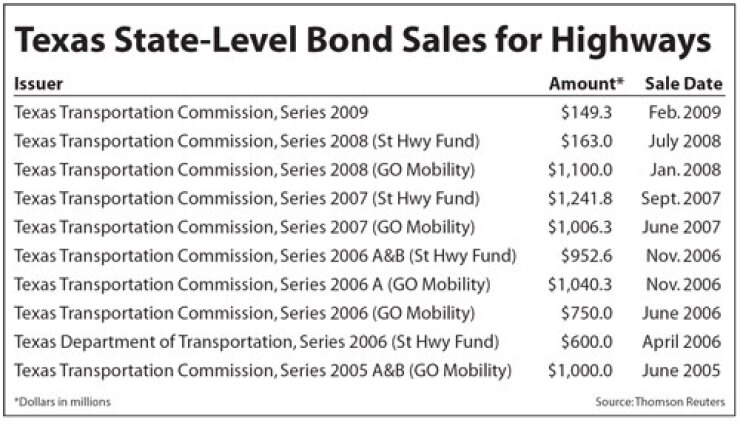
DALLAS - Despite reservations about the state's rising debt service amid falling revenues, Texas transportation officials plan to issue all $4.9 billion of voter-authorized bonds for its projects as soon as possible.
In a discussion at the Texas Transportation Commission meeting last week, James Bass, chief financial officer of the Texas Department of Transportation, noted that fuel tax receipts since September are down about 2.5%, or $49 million. In April, receipts fell 8% or $15 million.
TxDOT has long anticipated declining revenues from fuel taxes as motorists drive less in the current recession and consume less fuel with more efficient cars. Nonetheless, the agency had expected a 1.5% increase in revenues since September.
Texas, which contributes more to the Federal Highway Trust Fund than it receives, is also expecting its share of the highway fund to shrink amid budget constraints in Washington. The federal stimulus funding distributed for state transportation projects was a one-time event.
Given the falling revenue, Bass expressed caution about maxing out on debt. The state's biennial debt service for transportation bonds is expected to hit $1.6 billion by 2011. Those debt-service payments are authorized by the Legislature, which meets every two years.
Acknowledging Bass' concerns, Deirdre Delisi, chairman of the TTC, ordered the agency to proceed with all authorized debt, which stands at $2.9 billion and is expected to grow another $2 billion after the special session of the Legislature convenes on Wednesday.
The Legislature's failure to authorize $2 billion of voter-approved highway bonds was among the three items Gov. Rick Perry listed in his call for the special session last week. Also included was a call to keep TxDOT itself in business, along with four other state agencies that would be forced to close under the state's Sunset Act without further legislative approval.
To reassure investors, the TTC issued a disclosure statement earlier this month to the financial markets about how closure of the agency would affect bond payments.
"State law also provides that such action under the Sunset Act does not impair or impede payment of the commission's and department's bonded indebtedness or any outstanding obligations and that such obligations remain enforceable according to their terms," the statement read. "Additionally, debt service on the commission's traditional debt programs, the Texas Mobility Fund and State Highway Fund, is automatically appropriated by the Texas Constitution."
TxDOT's very existence has been up for debate in the past two legislative sessions as key lawmakers accused the agency of holding too much centralized power over planning and execution of highway projects. Some lawmakers also objected to TxDOT's promotion of privately developed toll roads at the behest of Perry and the late TTC commissioner Ric Williamson.
Under the current structure of the TTC, Perry retains power to name the commission and its chairman. Perry appointed Delisi, his former chief of staff, as the permanent replacement for Williamson this year.
In the regular session that ended June 1, lawmakers were considering a change in the structure of the TTC, including reducing the commission to a single commissioner who would answer to the Legislature and be less influenced by the governor. However, the proposal to alter the composition of the commission died along with the TxDOT bond funding and the authorization to keep the agency alive.
Among the measures that died in the 330-page transportation bill was a provision to allow adoption of local option taxes to finance regional transportation projects. That was seen as an end run around the Republican Legislature's refusal to raise fuel taxes that have not been increased since 1991.
If the 2011 Legislature does not drastically increase spending on transportation, all new road projects will end by 2012, according to TxDOT.
On Friday, Sen. John Carona, R-Dallas, chairman of the Senate Finance and Homeland Security Committee, filed the bill that would authorize TxDOT’s so-called Proposition 12 bonds and a revolving fund for the debt.
"I think these concepts are well accepted and should move rapidly through the process," Carona said in a statement.





